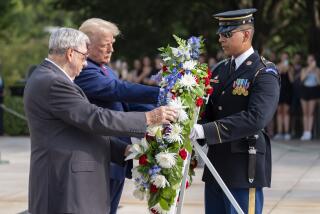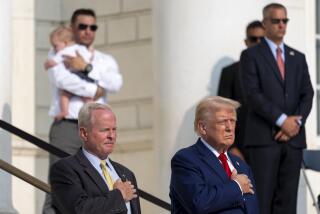At Arlington, ‘we all share in the same loss’
- Share via
Reporting from Arlington, Va. — It’s a perfect autumn Sunday and Chad Weikel is sitting outdoors, having a beer with his big brother, Ian. Chad’s beer is resting in the cup holder of his folding chair. Ian’s is propped up against his headstone.
Army Capt. Ian Weikel, 31, was killed in action in Iraq on April 18, 2006, so this is how they visit now.
Three rows back, Nicki Bunting’s 3-year-old, Connor, is building a campfire for his dad. Or maybe it’s an ant farm. He hasn’t decided. He was 1 when his father, Army Capt. Brian “Bubba” Bunting, was killed by a roadside bomb in Afghanistan on Feb. 24, 2009. They drive from Maryland to “visit Daddy” every Sunday — Connor, his mom and his little brother, Cooper, an R-and-R baby conceived a month before his father died.
You don’t see scenes like this at very many gravesites in America; in fact, you don’t see them anywhere else but here at Arlington National Cemetery, the hallowed burial ground for two U.S. presidents, 12 Supreme Court justices and veterans of every war since the Revolution.
This is Section 60, where more than a tenth of the casualties from the wars in Iraq and Afghanistan rest: 648 at last count, more than in any other single place. These service members died recently, and they died young. The grief here is raw — parents who outlived their children, spouses still raising their babies, friends who thought death was an older generation’s burden.
Their sorrow has a tragically youthful spin that defies the rigid orderliness of a military burial ground better known for riderless horses and gun salutes. Section 60 is strewn with bits of unfinished life: carved pumpkins, cigars, a birthday cake, an “It’s a Boy” balloon, Mardi Gras beads, a note — “We love you son. Always will.” — a Darth Vader doll, a can of Bud Lite.
“We all share in the same loss,” Nicki Bunting says. “In any other section or cemetery, I don’t know each person’s story. It could have been cancer or a car accident. But in Section 60, we’ve all had the same knock at the door.”
On Thursday, the nation pauses to honor all who served and remember the fallen. Visitors will flock to Washington’s monuments erected for nearly every American war. But there is no memorial for the two wars still raging. Section 60, on 18 acres of grass across the Potomac River from the nation’s capital, has come to serve that purpose.
Individually wrapped roses appeared one day on 100 graves. A man in a kilt with bagpipes showed up and played Taps. Busloads of schoolchildren come to visit the graves of service members whose stories they’ve looked up. Day hikers walk the rows and do the math: He was 19; she was 22; he was 31.
Sometimes private grief and public curiosity collide. Tourists snap pictures without permission; they say the wrong thing. Mostly, though, it works out. On weekends and holidays like this one, Section 60 has the feel of a big backyard, where families gather to heal and condolatory neighbors pass by.
“It’s not really a sad place; it’s a peaceful place,” Nicki says, putting the colored rocks that decorate her husband’s headstone in her jacket pocket before the baby swallows one. “Of course you see people crying. We cry sometimes. But then you see somebody you know, and you start talking. Or you meet someone new. That’s what’s great about Section 60.”
Through nine years of war, a community took root here; people with something terrible in common forged a kind of fellowship.
Nicki arrived at Bubba’s grave Sunday afternoon to find purple gerbera daisies. Must have been Paula Davis. She likes to leave artificial flowers when it’s too cold for real ones. Her son, Pfc. Justin Davis, a few rows up, was killed in Afghanistan by friendly fire on June 25, 2006.
Two headstones away from Bubba’s grave is Army Spc. Jessica Sarandrea, killed March 3, 2009, in Mosul, Iraq. She was 22. Her parents came from Florida to visit on Memorial Day. They got to talking and Nicki offered to watch over Jessica’s grave.
She places a colored stone on the marker, a popular tradition in Section 60. It stems from the Jewish custom of putting pebbles on a headstone to show a visitor came to honor the dead. But like everything else here, the traditional makes way for the extraordinary and the markers are dotted with red hearts, white ghosts and hand-painted rocks. Purple stones are the Bunting family’s calling card; Bubba was a Ravens fan.
Section 60 opened 30 years ago. There were already close to 8,000 graves of veterans and their families when the bodies started coming home from Afghanistan and Iraq. The funerals average five a month now, “depending on the operational tempo over there,” Arlington spokeswoman Kaitlin Horst said.
Bubba’s grave is No. 8,758. The day he was buried, his was third from the end of the last row. Since then, six more rows have gone in.
That misty day, when Nicki stood at the freshly dug hole in the designer black dress she bought — thinking if anything would jolt Bubba back to life it would be her spending $300 on a dress — she could not imagine feeling anything but grief.
In time, though, Section 60 felt like home. This is where she met her friend Sheryl, whose husband, Marine Sgt. James R. McIlvaine, 26, father of two, was killed in Iraq about two months after Bubba. He’s in the next row, with a Darth Vader doll and a can of Bud Lite.
Here, Nicki can talk all she wants about her husband and no one gets uncomfortable. Last December for his 30th birthday, she brought a sheet cake and threw him a party with 30 people.
“I don’t get to be Bubba’s wife anymore, not in the way I planned it,” Nicki says of her husband of 21/2 years, a West Point graduate and all-star athlete. “I do what I can now to honor his name and take care of him. I didn’t want this role but I will do the best I can.”
Anyone killed in the line of duty is eligible for burial at Arlington, but not all military families choose it. Some want their loved ones closer to home, like the family of Marine 1st Lt. Travis Manion, 26. He was buried in his hometown of Doylestown, Pa., after a sniper shot him in Iraq in 2007.
But when his best friend, Navy Seal Lt. Brendan Looney, 29, was killed in a helicopter crash in Afghanistan two months ago, the Manions moved their son’s remains to Arlington. Now Travis Manion and Brendan Looney, Naval Academy roommates, lie side by side, beneath two gleaming piles of Marine Corps marathon medals won by their buddies the week before.
It’s getting cold. Chad Weikel, 33, and his girlfriend, Kate Thompson, 31, finish their beers. He lives nearby and figures he’s done this at least 75 times since his brother died. He doesn’t feel like talking much. “When I first came here, it was really hard. But it’s a community and a family. Days like Memorial Day, there are 200 people having picnics. And then there are days like today, quiet and beautiful.”
They carry their chairs to the black Chevy truck that used to belong to Ian. An unopened bottle of Texas-brewed Shiner Bock stays behind, a nod to his unit at Ft. Hood.
Once a week, groundskeepers collect what isn’t perishable for storage in a warehouse. It isn’t clear what will become of it all.
Connor is finished building and the verdict is in: It’s an ant farm, for “good ants.” Nicki laughs and squeezes him tight. “I love you, buddy.” Not a day goes by when she doesn’t wish she could undo what can’t be undone. She’s trying hard to keep Bubba in their lives, giving him his say on what preschool Connor should attend or what to name the baby. Discussions they might have had in their bedroom play out in her head now.
Bubba gave her express permission to move on with her life, when they had their “just in case” talk.
“But we’re not there yet,” she says, smiling. She is 29.
“OK guys, family hug.” The three of them encircle Bubba’s headstone and hold tight.
Their blue minivan is parked a few feet away, a privilege afforded family members. She straps the boys in their car seats and trots back to the grave. She replaces the colored rocks that were in her jacket and straightens the purple daisies the baby rearranged.
Then, when everything is as orderly as Nicki Bunting has the power to make it, she kneels down, closes her eyes and gives the headstone one more kiss.
More to Read
Sign up for The Wild
We’ll help you find the best places to hike, bike and run, as well as the perfect silent spots for meditation and yoga.
You may occasionally receive promotional content from the Los Angeles Times.






